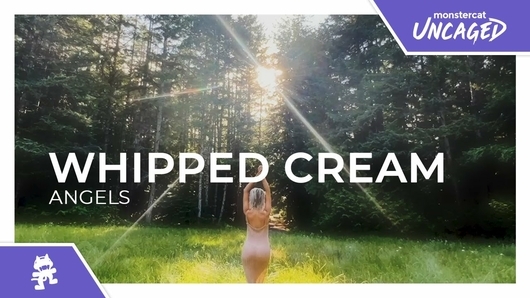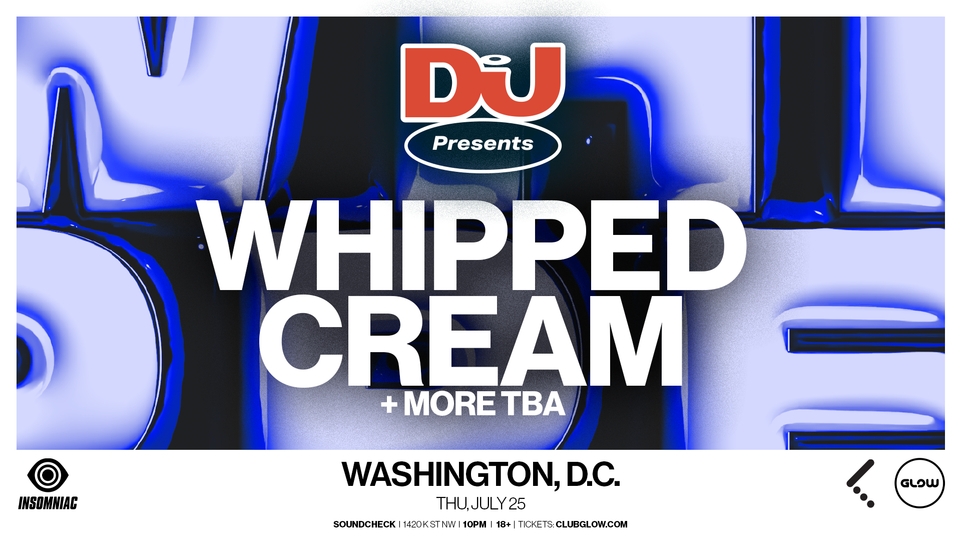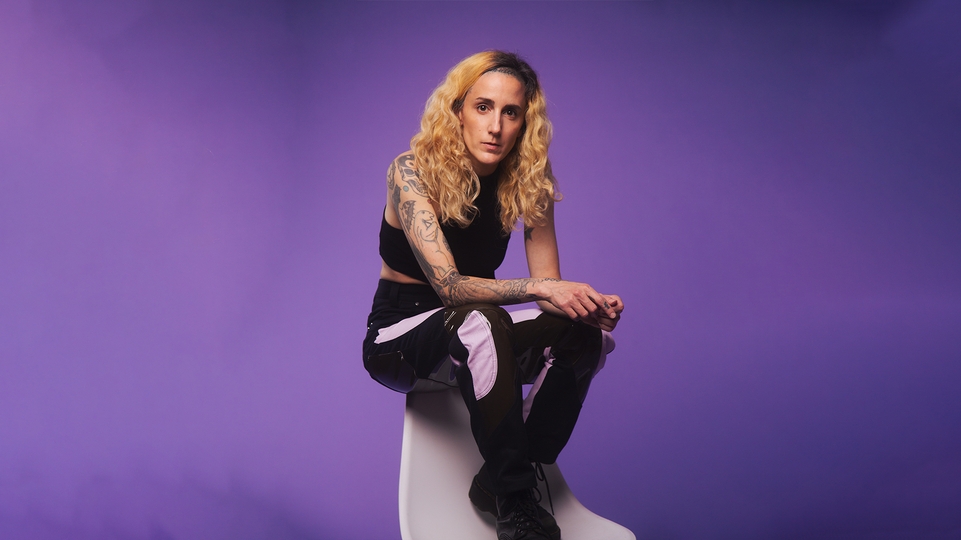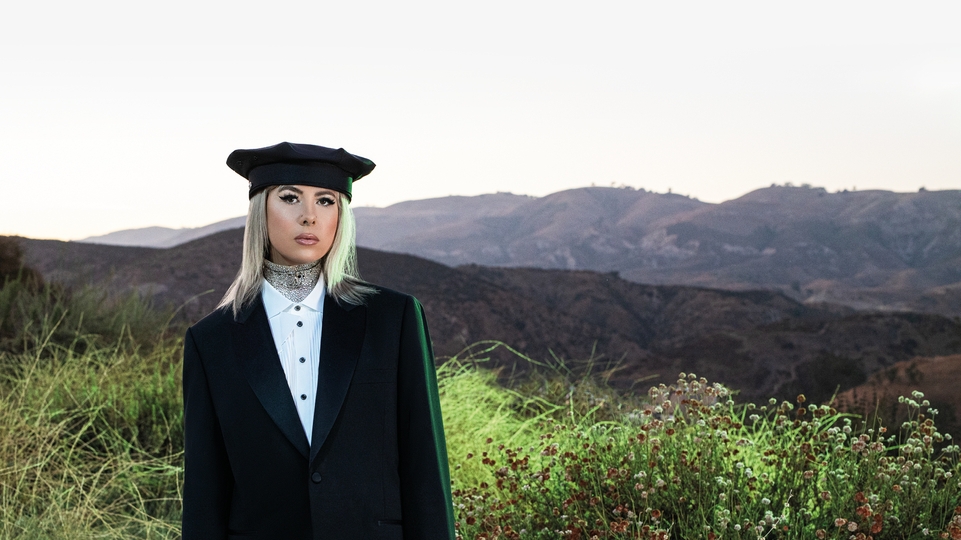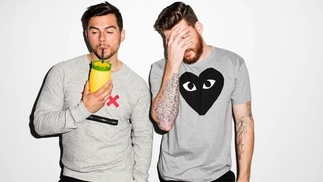
WHIPPED CREAM: stepping into the unknown
Ever since a sudden and unexpected change in career trajectory, Caroline Cecil’s full focus has been on music. That has paid off: While working as WHIPPED CREAM, she’s managed to climb to electronic music’s top rungs in just a few short years. With the release of the new ‘Someone You Can Count On’, along with a journey toward self-discovery, she’s entered what feels like a new phase in her life
Caroline Cecil tends to speak with a near stream-of-consciousness cascade of positivity. She buzzes with wonderment and joy, surprised at where her life has taken her, grateful at where she seems to be landing, and ready for whatever comes next. And who can blame her? Working as WHIPPED CREAM, the DJ and producer has risen in what seems to be the blink of an eye — though in reality, it’s been a decade — to find herself in the top echelon of festival favourites.
Cecil’s often categorised as a bass artist, though in reality she paints with a broad enough stroke that WHIPPED CREAM’s music is essentially genre-free. Sometimes dark and heavy, at others buoyant, occasionally aggressive, and nearly always infused with her innate ear for melody, it’s a sound that’s taken her far, culminating in her new ‘Someone You Can Count On’ EP, perhaps her best and most personal work to date.
Two-and-a-half years ago, Cecil released an EP on Atlantic Records sub-label Big Beat called ‘WHO IS WHIPPED CREAM?’ — but it’s the new EP that has the feel of an artist zeroing in on their core essence, both lyrically and musically. “With ‘WHO IS WHIPPED CREAM?’ — back then, I didn’t know who the fuck WHIPPED CREAM was, really,” Cecil says via Zoom. “I thought I knew, and the sound was forming — but with ‘Someone You Can Count On', I finally do know who I am.”
Judging from the EP, WHIPPED CREAM is, among other things, an intensely emotional being — or at the very least, a producer who can translate emotions into music better than most. A few of its tracks practically seethe with stormy feelings; others have the vibe of a welcoming lullaby; others could almost pass for a pensive Kate Bush tune, if Bush had a newfound fondness for tough percussion.
‘Someone You Can Count On’ features a number of vocal collaborations — but surprisingly, the release marks the first time that Cecil’s utilised her own voice in her music, on the cuts ‘Angels’ and ‘Be Here (La La La)’. Both tunes — the former an intense stormer, while the latter, produced with LA rising star The Duchess, a chugging gem — harness minimalist lyrics to impassioned effect. “Angels cry / just like I do,” she sings on ‘Angels’; “When you leave / I can’t think clear,” go the words to ‘Be Here (La La La)'. The stark efficiency of the lyrics contrasts well with their rich synthesised setting.
And then there’s ‘The Dark', a near-operatic tune imbued with heightened, almost over-the-top drama. Coproduced by Crimson Child, it features the sui generis vocalist Jasiah, dramatically intoning lyrics like “I feel like I’m falling within myself / You had me going through all this hell’. “Watching Jasiah record this song — I wish I could recreate that day, because it was one of the best days of my life,” Cecil says. “The engineer and everyone there was like, ‘What did we just do?’ We were so happy we could have cried.” Still, it’s a bit difficult to square those lyrics, and the song’s devastating intensity, with the super-friendly, smiling visage on the laptop screen.
“During the time I was writing the songs,” Cecil says, “I was going through a lot of stuff. I might have been hurt or whatever. But it’s all life lessons. And before, I used to not always like myself so much. I’d beat myself up and find myself in situations that would really hurt, where I’d feel uncared for, and especially as a female in this industry, it can be scary sometimes. But you can count on yourself.”
Making and playing music, let alone singing, was not Cecil’s original life plan. Born in Toronto, she was ice skating while still a toddler, and taking part in figure-skating competitions by the time she was eight, with the dream of eventually competing in the Olympics. But even then, music meant a little bit more to her than it did to a lot of her peers.
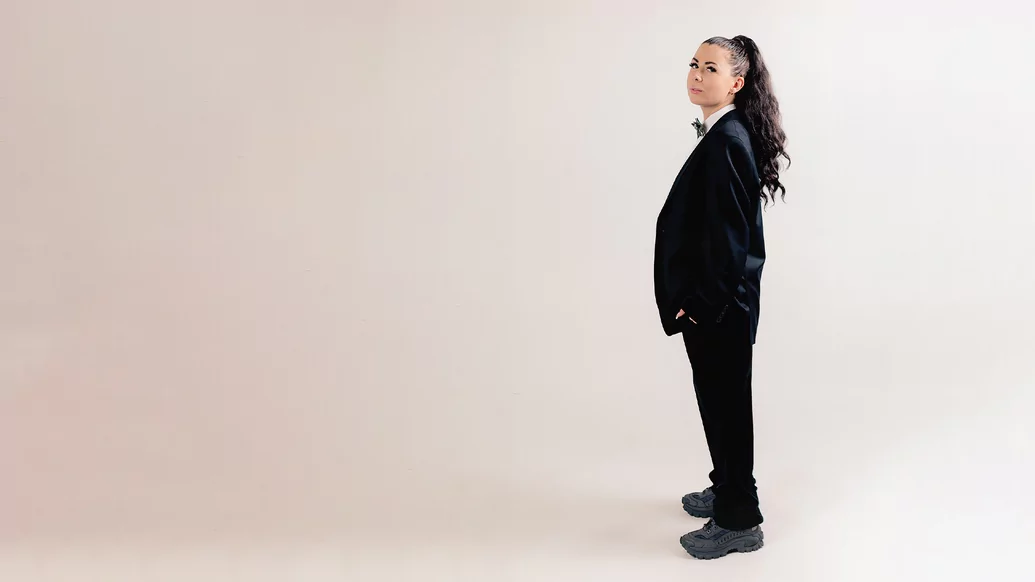
“Something just turned on in me and I thought, ‘this is it’ — even though I had no real music background, and didn’t even know anyone who was doing this. It was like I walked into a room and God was like, ‘This is your path!’”
“My dad thinks that he is the reason why I do what I do,” Cecil explains. “When I was just a baby in the hospital, he had a boombox by my bed, and the first song he played right after I was born was [Simon & Garfunkel’s] ‘Bridge Over Troubled Water’. That boombox was by my bed for the next two weeks. And as a child, I was just always making music videos, dancing around — my dad always had a lot of soul music.” (Electronic music came later — Madonna was her gateway drug, she says, which led to The Chemical Brothers, which eventually led to everything else). “The reason why I skated was just to express myself through music on the ice.” She even got to choose the soundtrack to her dance routines.
“My dad had this program, I think Audacity, and he would edit my music for me,” she says. “We’d have a whole bunch of songs I'd like from different movies or commercials or wherever, and he’d make these sort of mixtapes for my competitions. I definitely had the best music. I would always win the Most Artistic award, because I could express myself to the music.”
At age 12, Cecil and her family moved across the continent, to Nanaimo on Vancouver Island. She wasn’t particularly happy about making the move — when you’re a tween, leaving your friends and everything you know is rarely part of the plan — but her family made the most of the move itself. “Going there was actually a pretty awesome time, because we took three months off, and my dad put us on an RV and took us through a whole bunch of different states — we went through America to get to Nanaimo. That was a memorable time, but starting in a new place at grade five was pretty hard the next couple of years.”
She had trouble making friends, and claims she didn’t really begin to fit in till 10th grade, “when I started finding a little bit of confidence, and I was meeting the right people.” But at least she always had figure skating — until she didn’t. When Cecil was in her final year of high school, she suffered a life-changing injury on the ice. She was practicing her triple toe loops — not an easy move, even for someone with her skills — landed wrong, and busted her ankle, badly, to the point where her surgeons had to hold her together with a metal plate and six pins. Post-surgery, the doctors told her she’d never skate the same again; she may end up with a limp.
“I was in grade 12 — prom was going to be that year, I was graduating high school, all of that, but none of that really mattered to me,” Cecil says. “Skating mattered to me. For the first and only time in my life, I actually felt suicidal. A lot of people were extremely concerned for me, because I was very young and didn’t know much about other things. It was my entire life.”
Eventually, though, her depression began to lift. “I started seeing a little light that meant everything was going to be okay. All you need is to know that people around you love you, and that there’s purpose, always. Once I could think clearly, I said to myself, ‘Okay, I’m going to walk again first, and then I’m going to skate again second. I’m not going to let this doctor tell me what I can and can’t do.'”
Cecil got back at it. She moved out of her parents’ house for the first time in her life and began to train again, eventually regaining not only the ability to walk without a limp, but most of her skating skills as well. But her heart wasn’t in it, at least to the extent it had been before the accident. “I made a decision within that year that I wasn’t supposed to be doing this anymore,” she says.
She does occasionally still strap on the skates. “I still love skating,” she says. “It’s so much fun. I still got a couple of tricks left in me. It wasn’t like, ‘Oh, I’m not good anymore.’ It was just that I thought I was happy doing it full-time, and I wasn’t, and it was time to do something else. But I had no effing idea what that was. I had no idea what I was going to do. I had no money and I thought, ‘Oh, I’m just going to travel. Like, I’ll go to Australia and go find myself or something’.” She spent the next few years in the wilderness, career-wise, eventually taking a job at a call centre at Bell Canada. But a date with destiny was on the way.
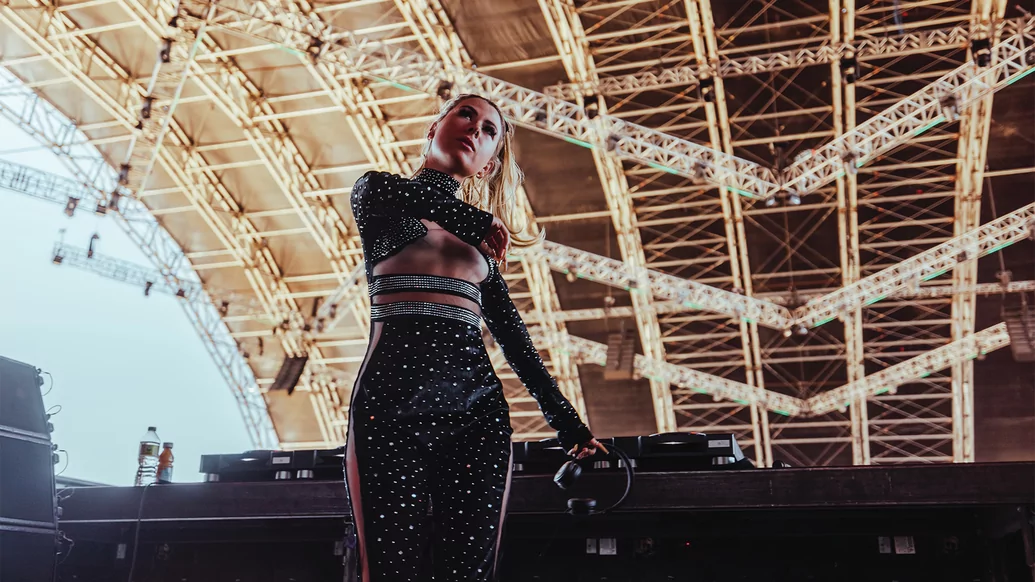
In 2012, Cecil attended the long-running (now defunct) Sasquatch! Music Festival, held at The Gorge Amphitheatre in Washington state. “I had to be dragged, really dragged, there, by a best friend,” she recalls. “And that was where I saw my first electronic show.” There were two specific performances that began to reshape Cecil’s life. The first was courtesy of Patrick Grossi, the singer, songwriter, and producer better known as Active Child, who released his debut album, the soundscape-ish R&B-meets-dubstep opus ‘You Are All I See', the previous year. She still cites Grossi as an influence.
“That was the ‘aha’ moment,” she says, but it was another show at the festival, this one from the British electronic prog-EDM trio NERO, that sealed the deal. “NERO in a tent, like an actual rave — that made me go ‘Whoa',” she says. “I had never experienced anything like that at all. I was like, ‘What is this? This is insane!’ Something just turned on in me and I thought, ‘this is it’ — even though I had no real music background, and didn’t even know anyone who was doing this. It was like I walked into a room and God was like, ‘This is your path!’ From that day on, I was so different, It was actually really weird.”
With the same obsessive focus she had undoubtedly brought to figure skating, she buckled down and got at it. She took her call center savings and picked up Ableton and FL Studio, before settling on the former as her main DAW for its relative ease of use. (She’s now proficient in Ableton, FL Studio and lots more, needless to say). “I quit my job, and I broke up with my boyfriend, and kind of actually broke up with everybody in a very friendly, loving way,” she says. “I realised that it was going to be a lot of work— and I don't even know how to speak the language. I thought I needed a couple of months, but it ended up being two years away from everyone, just in my bedroom learning how to do this. I wanted to do it so bad.”
She’d also picked up a Traktor S4 controller, and began to master DJing. “I definitely learned to DJ first,” Cecil says. “That came a lot quicker. I would go on YouTube, and I was really into people like Bauer and RL Grime and DJ Slink and Swizzy Mac. But really, I didn’t know anything about making music. All I knew is that I could feel it. So I literally would type into YouTube something like ‘how to make a trap beat.’ I would just pause it and press play, pause it and press play, trying to figure it out. It was kind of ridiculous, but that’s how I learned.”
But learn she did, and before long, she was posting her first re-edits online. “What was cool about SoundCloud back in the day was that you could put whatever you want on there and they wouldn’t take it off,” she says. “There’d be a really hot song that came out that I loved, and then I would go and make Jersey club edits. I loved making Jersey club. I was getting my favorite samples of the record and manipulating audio. That’s all I knew how to do back then. I’d crush these cool, innovative bits of percussion, transposing things down and add little vocal chops, making sure there was a lot of energy in the music.”
It worked. One of her earlier efforts was an edit of Ella Eyre’s remake of Jermaine Stewart’s ‘We Don’t Have To Take Our Clothes Off'. It garnered around 15 million plays on SoundCloud, she says — it’s long since been scrubbed, but the YouTube version currently sits at 31 million views. “It was just going and going,” she says, still seeming amazed by the reaction. “What I did was, I sped it up and put a nice beat under it. When I listen back, I’m like, ‘Oh, the 808 is out of key or whatever’ — but people still loved it.”
Its success garnered her an invitation to DJ at the 2015 edition of the Shambhala festival near Nelson, British Columbia. “And once I played Shambhala, industry people started being like, ‘Oh, my God, who is this?’ Pretty soon, I started touring.” Cecil also began releasing legit tracks of her own. Just over two years after seeing Active Child and NERO, she had released her debut EP, ‘Law Of Attraction', a trio of swaggering Jersey-club-goes-to-the-festival tunes that got her yet more attention. Ever since, she’s been going seemingly nonstop, with the festival gigs, club sets, and releases coming fast and furious.
Among other highlights, one of her cuts, ‘So Thick', featuring Baby Goth on vocals — one of Cecil’s more overtly trap-tinged tunes — found itself on the soundtrack of the Harley Quinn movie Birds Of Prey, alongside artists like Doja Cat, Halsey, Saweetie, and Megan Thee Stallion. At the time, Cecil had been in discussions with Atlantic Records imprint Big Beat about getting picked up as an artist on the label.

“Everyone loves what a rose looks like. It’s so elegant and beautiful. You want to keep it close, you want to hold it tight, but there are thorns on it — and if you hold too tight to something that isn’t safe, it’s going to cut you and you’re going to start bleeding.”
“It was really crazy how that came about,” Cecil explains. “I was in New York, sitting in [Atlantic Records honcho] Kevin Weaver’s office, and he’s like, ‘Hey, we’re doing the music to this movie Birds Of Prey. It’s all female. It would be so amazing to have you in this.’ He explained what they were looking for, like an anthem. I thought, ‘Oh yeah, I’m gonna get this for sure...’ I played him three songs that I thought were going to fit the vibe — cinematic anthems that, in my mind, would work in a movie. But he just said, ‘They’re good.’” (Cecil imitates him saying this in a convincingly noncommittal tone). In the meantime, there was another song in the folder that she loved, “but I didn’t play it, because I didn’t think he was gonna like it.
“Later, I got a call from my A&R,” she continues. “She was in a meeting with Kevin, along with people like Cardi B’s A&R and Janelle Monáe’s A&R, to talk about the Birds Of Prey thing. She played that song, the one that I didn’t suggest — and everyone was like, ‘This has to go in the movie.’ They didn’t even really want me to change anything. If she didn’t play it? It wouldn’t have happened!”
It was a lesson learned — trust yourself, and go with where your heart is. “That’s exactly what it was,” she admits. “Mistake, rookie mistake. It was a little life lesson. Now I’m just following what’s within myself, and I’m feeling a lot more secure because of that.”
To hear Cecil tell it, that freedom to experiment, that license to be truly herself, is thanks in part to her current label, the indie juggernaut Monstercat. “Oh my God, I could scream it from the mountain tops! They have been so amazing,” she enthuses. “They’re open to experimenting with sound and doing things that have never been done before, either. The people at Monstercat — what I love about them is that they’re open, they’re passionate, and I don’t feel like a number.”
Cecil admits to being a visual thinker, at least in part when it comes to her creativity. “Every song I make, there’s always a visual concept behind it,” she says. “That’s just how I’ve always made music. And going to movies inspires me. Like, when I went to see Sicario, I came home and wrote ‘You Wanted It’. You know, if I had all the money in the world, I’d be making full-on storytelling movies, like full-on experiences.”
She’s going to be inching close to that kind of experience via the upcoming video for ‘The Dark’. “The song is about a toxic love, and I had this vision while Jasiah was singing in the studio,” Cecil recalls, “and I started writing the music video concept in my little notepad on my phone. The concept is, everyone loves what a rose looks like. It’s so elegant and beautiful. You want to keep it close, you want to hold it tight, but there are thorns on it — and if you hold too tight to something that isn’t safe, it’s going to cut you and you’re going to start bleeding.
“There is love in holding on and there is love in letting go. It’s about a relationship where one person hasn’t cut out their toxic behaviours, and although beautiful underneath, they still damage the one they love most. It’s learning to finally let go of what might be so beautiful, yet painful and unhealthy, and head into the unknown — the dark.”
She sent her idea — which, in true filmic fashion, involves her and Jasiah in wedding outfits, situated among vast vistas — over to Monstercat. “And this was before me and Monstercat had really even done many records together,” she says. “I didn’t know how much it was going to cost, and I didn’t know how we would even do this. But they quickly responded, ‘You are just insane, you have such a cool mind. We’ll try to make this happen!’"
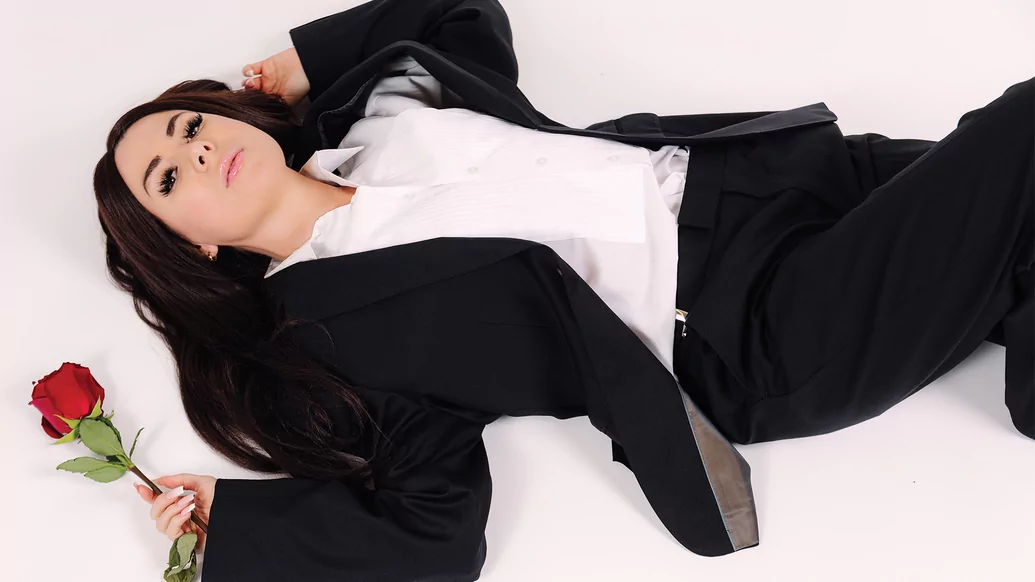
A few months later, through a friend of someone who works at Monstercat, a connection was made with Departure Lounge, an organisation that houses Canada's first volumetric capture facility, Metastage — which, in their words, “offers an integrated suite of tools and technologies designed to facilitate the transfer of humans and objects into and out of the Metaverse. With the shared goal of telling authentic stories through music, Departure Lounge uses 106 advanced cameras to capture the artists in real time and transport their holograms into a virtual reality environment, producing the world’s highest-resolution VR music experience to date.
“They were like, ‘We might be able to do your idea, but it's not going to be exactly like how you envision.’ That’s what they say in these manifestation books — you’re usually going to get not what you want, but what you need. It might be very close, or it might be nothing at all like what you had thought. But I never in a million years thought I’d be at Emily Carr [University of Art & Design, where Metastage is housed], flying Jasiah out, filming this thing that has never been done in Canada before.”
From the outside looking in, ever since the release of ‘Law Of Attraction’ and that gig at Shambhala, it would seem as though Cecil’s life has been an unending swirl of activity — and it undoubtedly was, at least until the pandemic hit. “It’s crazy, but that one year was like a total write-off — but it was also one of the best years of my life, because that’s when I started realising a lot of things about myself,” she says. “I didn’t have time to do that before. Even just taking the time to do things like skin care, and do a healthy regimen with my diet, and do all these things that most people already did.
“I had never really done that before because I was so involved with my work. I wasn’t happy, even though everybody thought I was. You just put on the smile, and you go perform. It’s not really being fake — it’s more like, you genuinely think that you’re kind of happy, but you’re actually not.”
But it took a bit longer for her to truly find herself, she feels. “It’s been the last year, maybe just the last six months, when I’ve started diving even deeper within myself and realising a lot of things — like patterns that I had fallen into, always making the same choice instead of changing that choice.
“The one book that really helped me was Breaking The Habit Of Being Yourself by Joe Dispenza. It helped me to realise that I don’t have to be who I think I am. I can actually change that. And if there’s something that I’m insecure about, or sad about, that doesn’t have to be my reality, I can literally rewire my behaviour to make a new reality. Once I realised that, I started doing some in-depth meditations and hypnosis. And through these things, I feel the utmost gratitude to be alive, first and foremost, but also protected to whatever is coming my way, because I’ve done a lot of that spiritual work.”
Cecil’s life does seem quite sedate at the moment, judging from the itinerary she gives of her normal routine. “Usually, I’ll be waking up around 7:30 or 8am, having coffee, doing meditation — just 10 minutes, just a guided meditation to start my day — and I like to fast till about one or two,” she says. “I open up Ableton and make music until two or three, because that’s when I’m most creative. After that, I’ll be like, ‘Okay, I better deal with managers and whatever’s going on, and emails and stuff.’
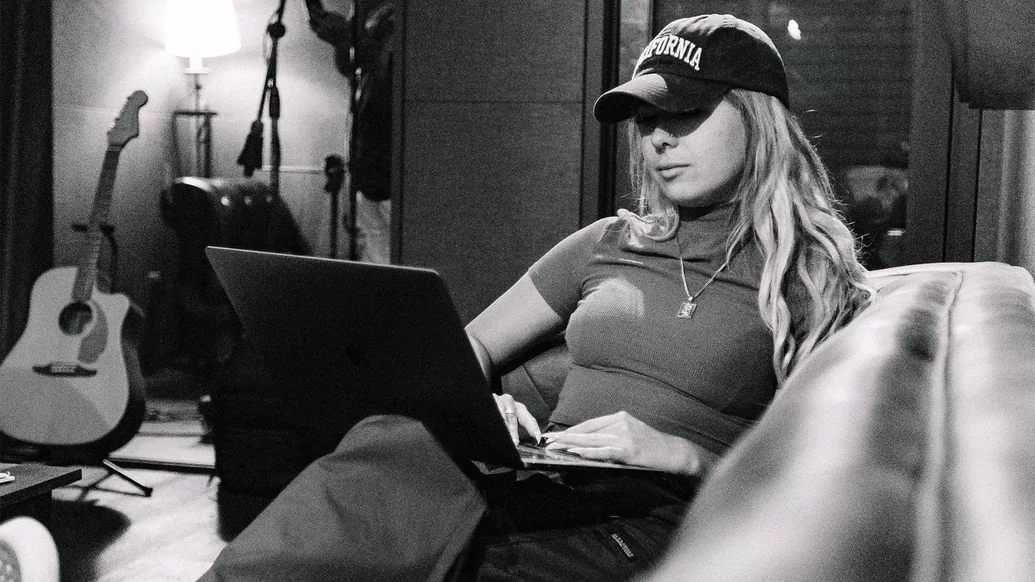
"I’m still going to be doing this no matter what. Even if I had my hands chopped off, and one ear is gone, I will still be behind a computer making music. I’m so enthralled with my life.”
“Then I’ll go outside. I love being 100 percent in nature. I love living in British Columbia because there are trees and mountains and mud everywhere. And I’m going to go do at least half an hour to an hour of some kind of physical thing — it releases endorphins within me. Then hopefully I’ll see a friend. If I’m lucky, I’d love to spend time with my good friends and have a good dinner. I’m not one of those night owl people, believe it or not — I like to go to sleep by midnight at the latest.”
That schedule may have to change soon, as duty calls — soon after the release of ‘Someone You Can Count On', Cecil will be leaving her cozy North Vancouver confines to go on tour. The gigs will be DJ dates, but she says there will be some surprises in store — though she’s not yet at liberty to share more details. Whatever the case, in her post-skating world, she and her music — Cecil and WHIPPED CREAM — are in a state of wedded bliss. “There is nothing else I would do,” she says with conviction. “Like, really nothing — I’ve found it. I’m still going to be doing this no matter what. Even if I had my hands chopped off, and one ear is gone, I will still be behind a computer making music. I’m so enthralled with my life.”
She has big plans for that life, too. “When I’m ready, when I’m older, I want to do things like produce for the biggest ballets and orchestras, or do a collab with Hans Zimmer, or do a live circus experience, or make a National Geographic soundtrack when they go to Zimbabwe or somewhere. There are so many things I can do as a producer, and there’s nothing else that I’m passionate about.”

